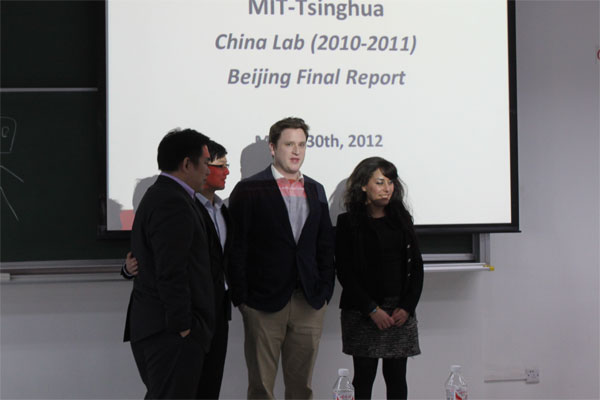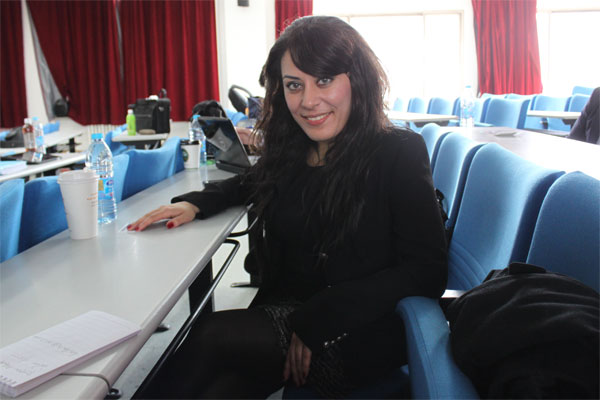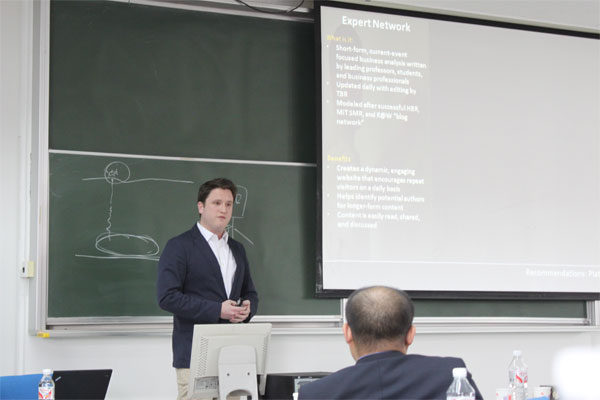MBA students point way for Chinese firms
- By Wu Jin
 0 Comment(s)
0 Comment(s) Print
Print E-mail China.org.cn, April 1, 2012
E-mail China.org.cn, April 1, 2012
The Master of Business Administration (MBA) candidates from Tsinghua University and the Massachusetts Institute of Technology (MIT) yesterday (Mar. 30) presented the tables and graphics that they had spent weeks designing to senior consultants and clients at Tsinghua University’s School of Economics and Management.
The presentations comprised four groups, each made up of four students from the two schools, renowned for their common pursuit of science and rationalism.
The presentation was, in fact a competition held by MIT-Tsinghua China Lab. The competition, which is collaboration between the two prestigious schools, aims to offer business students a taste of real-life experience beyond the rather more sheltered academic world. As the competition developed, it became clear that students were indeed broadening their horizons and sharpening their business antennae.
|
|
|
Laila Zemrani |
Vivien Xiong, the Chief Executive Officer from AE&E, a Geo-Microbial technology company based in Beijing, joked that, as a result of the students' presentations, her company’s research costs had been cut.On a more serious note, Xiong, a two-time China Lab client, was struck by the students’ research and analytical abilities.
She was mesmerized when the students compared AE&E's bacteria oil exploration technology with an improved X-ray machine which enables observers to see both the skeleton and muscles. They commented that the technology had a bright future, especially as a result of its ability to substantially cut oil exploration costs. The students also suggested that the company turn to a joint-venture model to leverage liability and reduce costs.
Despite its amicable and harmonious nature, the contest attracts its fair share of critics-some of whom focus their criticisms on the very amicability and harmoniousness of the contest. Fan Bin, a senior management consultant at IBM, and one of the contest's judges, commented that Xiong would get a completely different perspective if she hired a professional consulting company.
"The world of business consulting is different to what we see here [at the contest]," said Fan. "It's not such a friendly environment. You may be confronted by many challenges, in front of your customers, colleagues, and especially your competitors. But this is a good place to start."
Commenting on the benefits of the project, Laila Zemrani, a student from the Sloan School of Management who will graduate next year, said: "We get a very interesting project, a project that is actually a mixture of the knowledge we might bring, from outside of China, from the U.S."
For their competition entry, Zemrani and her teammates worked on remodeling the Tsinghua Business Review, an academic publication. They won the competition as a result of both their research and the spontaneous communication skills they demonstrated during their presentation. Their work on the magazine focused on increasing its popularity and profitability. Zemrani said that, her group devised a range of suggestions, including, using digital media, online media, and interactive communication techniques. They also raised the importance of coming up with new business models.
|
|
|
Michael Shafrir in the presentation |
Michael Shafrir, Zemrani’s teammate and schoolmate, suggested that the magazine should make itself less esoteric by shortening and simplifying its contents.
He said: "Our survey of readers and potential readers revealed that there is always a desire for short form content." Shafrir recognized the challenge of switching the academic magazine to online media platforms, as the Harvard Business Review has done.
According to Shafrir, the average length of an article in the print version of the Harvard Business Review is usually 5,000 words, whereas the online version would be trimmed to 500 or 700.
"We do see the forces of smart phone penetration," he said. "If Tsinghua Business Review was to provide content to optimize smart phones, not only computers, they would increase distribution, and bring academically-oriented content to an entirely new group of readers." he said.
The ideas and inspirations generated by the presentations cast a nostalgic air over many who, having previously graduated from MBA schools, now sat in the classroom as contest judges. Contest judge and Harvard Business School alumnus James Chang, now the Risk Consulting Partner of PricewaterhouseCoopers Consultants (Shenzhen Ltd), Beijing Branch, was one who was struck by the mood of nostalgia.
 |
|
The winning team of the MIT-Tsinghua China Lab competition |
"[It] brings back memories of when I was at Harvard Business School," said Chang. "I just want to say that the Harvard Business Review is fantastic, I do want to see Tsinghua come up."








Go to Forum >>0 Comment(s)